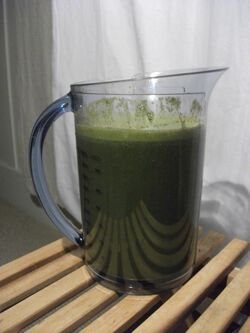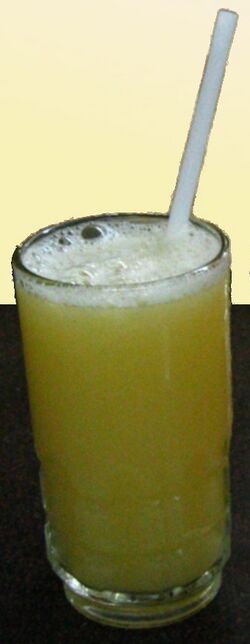Unsolved:Juice fasting
Juice fasting, also known as juice cleansing, is a fad diet in which a person consumes only fruit and vegetable juices while abstaining from solid food consumption. It is used for detoxification, an alternative medicine treatment, and is often part of detox diets. The diet can typically last from one to seven days and involve a number of fruits and vegetables and even spices that are not among the juices typically sold or consumed in the average Western diet. The diet is sometimes promoted with implausible and unsubstantiated claims about its health benefits.[1]
History
Juice fasting became a growing trend in the United States because of Norman W. Walker and Jay Kordich who worked to transform the juice drink into a diet.[2][3] Walker is considered to be one of the founders of the juice cleanse trend because of his technological contributions to the juicing process and his promotions of a raw food diet. In 1936, Walker created the designs for the first mechanical juicer that he named the NorWalk.[2] The modern Norwalk 280 version of his invention is still a high selling juicer, priced at US$2,495. In addition to this new technology, Walker also pioneered today's juicing cleanse through his many cookbooks that advocated for a raw, mostly liquid diet.[2] Kordich rose to fame through his book, The Juiceman’s Power of Juicing which became a New York Times best seller.[4] During the 1990s, Kordich worked as a TV spokesman who promoted the health benefits of a juice diet. Kordich also appeared in infomercials promoting his Juiceman Juicer that, according to Kordich, made over US$300 million in sales.[3] Walker's and Kordich's contributions to juice fasting propelled the diet to today's current version.[2][3]
In the twenty-first century, juice fasting has remained trendy with people continuing to believe that periodic juice cleanses can detoxify their bodies of unwanted chemicals. The ability for famous celebrities as well as other people to broadcast their juice diets on the internet has also popularized the lifestyle.[5]
Health claims
Health claims in regard to juice fasting are not supported by scientific evidence.[6][7][8] Catherine Collins, chief dietician of St George's Hospital Medical School in London, England, states that: "The concept of 'detox' is a marketing myth rather than a physiological entity. The idea that an avalanche of vitamins, minerals, and laxatives taken over a 2 to 7 day period can have a long-lasting benefit for the body is also a marketing myth."[9]
Detox diets, depending on the type and duration, are potentially dangerous and can cause various health problems including muscle loss and an unhealthy regaining of fat after the detox ends.[10] A review in The Gale Encyclopedia of Diets, has noted potential risks of juice fasting:
The major risks to health from juice fasts include metabolic crises in patients with undiagnosed diabetes or hypoglycemia; dizziness or fainting due to sudden lowering of blood pressure; diarrhea, which may result in dehydration and an imbalance of electrolytes in the body; and protein or calcium deficiencies from unsupervised long-term juice fasts.[7]
Juice mixes containing grapefruit juice may adversely interact with some prescription drugs.[11]
See also
- List of diets
- List of ineffective cancer treatments
- Fat, Sick and Nearly Dead
- Green smoothie
- Fruitarianism
- Juicing
- Juicer
- Raw veganism
- Raw water § Raw water dieting
References
- ↑ Valliant, Melissa (22 March 2012). "Do Juice Cleanses Work? 10 Truths About The Fad". Huffington Post. https://www.huffingtonpost.ca/2012/03/22/do-juice-cleanses-work_n_1372305.html?ec_carp=6901241575707901067.
- ↑ 2.0 2.1 2.2 2.3 Laskow, Sarah (2014-11-20). "The Man Who First Juiced Vegetables" (in en-US). https://www.theatlantic.com/health/archive/2014/11/the-man-who-first-juiced/382586/.
- ↑ 3.0 3.1 3.2 New, Catherine (2013-05-20). "Rebuilding A Juice Empire At Age 89" (in en). https://www.huffingtonpost.com/2013/05/20/juiceman-jay-kordich-rise-and-fall_n_3232665.html.
- ↑ Burros, Marian (1992-04-15). "Eating Well (Published 1992)" (in en-US). The New York Times. ISSN 0362-4331. https://www.nytimes.com/1992/04/15/garden/eating-well.html.
- ↑ Newman, Judith (2010-10-27). "The Juice Cleanse: A Strange and Green Journey (Published 2010)" (in en-US). The New York Times. ISSN 0362-4331. https://www.nytimes.com/2010/10/28/fashion/28Cleanse.html.
- ↑ Barrett, Stephen; Herbert, Victor. (1994). The Vitamin Pushers: How the "Health Food" Industry is Selling America a Bill of Goods. Prometheus Books. pp. 161-162. ISBN:0-87975-909-7
- ↑ 7.0 7.1 Frey, Rebecca J. (2008). Juice fasts. In Jacqueline L. Longe. The Gale Encyclopedia of Diets: A Guide to Health and Nutrition. The Gale Group. p. 594. ISBN:978-1-4144-2991-5
- ↑ "Juicing -- Fad or Fab?". Retrieved 22 December 2019. "No published research currently supports the safety or efficacy of juice cleanses or fasts".
- ↑ "Debunking detox". http://www.senseaboutscience.org/pages/debunking-detox.html.
- ↑ Zelman, Kathleen. "The Truth About Detox Diets". https://www.webmd.com/diet/a-z/detox-diets.
- ↑ Mihn Chau, Vu (1999). "Grapefruit Juice and Some Oral Drugs: A Bitter Combination". Nutrition Bytes (University of California) 5. https://escholarship.org/uc/item/7cn8p8k9. Retrieved February 2, 2019.
 |



